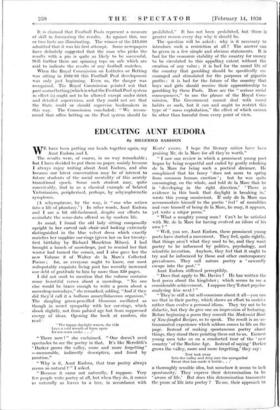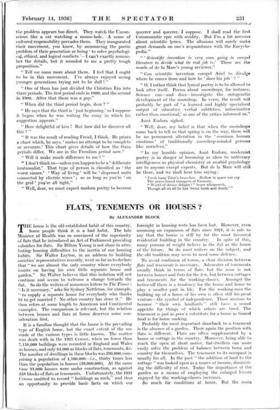EDUCATING AUNT EUDORA
By SIEGFRIED SASSOON
WE have been putting our heads together again, my Aunt Eudora and I. The results were, of course, in no way remarkable ; but I have decided to put them on paper, mainly because I always enjoy writing about Aunt Eudora, and also because our latest conversation may be of interest to future students of the social mentality of this acutely transitional epoch. Some such student may, quite conceivably, find in us a classical example of belated Victorianism, peripherised, perhaps, by schyiophrenetic symptoms.
(A schyzophrene, by the way, is " one who retires into a life of phantasy.") In other words, Aunt Eudora and I are a bit old-fashioned, despite our efforts to assimilate the sense-data offered us by modern life.
As usual, I found the old lady sitting composedly upright in her carved -oak.-chair-and looking extremely distinguished in the blue velvet dress which exactly matches her sapphire car-rings (given her on her twenty- first birthday by Richard Monckton Milnes). I had brought a bunch of snowdrops, just to remind her that winter had turned the corner, and I also gave her the new Volume 3 of Walter de la Mare's Collected Poems ; for, as everyone ought to know, our most indisputably exquisite living poet has recently increased our debt of gratitude to him by more than 350 pages.
I did not omit to mention that the volume contains some beautiful verses about a snowdrop. " No one else would be brave enough to write a poem about a snowdrop nowadays," she remarked, adding, "And if they did they'd call. it a bulbous amaryllidaceous organism." The dangling green-pencilled blossoms oscillated as though in secret sympathy with her ear-rings, which shook slightly, not from palsied age but from suppressed energy of ideas. Opening the book at random, she read :
The happy daylight wanes, the tide Lays a cold wreath of foam upon Its sea-worn rocks. . . ."
" There now ! " she exclaimed. " Ofie doesn't need spectacles to see the poetry in that. It's like Meredith's ' Darker grows the valley, more and more forgetting ' —memorable. indirectly descriptive, and fused . by emotion." • • " Why is it, -Aunt Eudora, that true poetry always seems so natural ? I asked. • " Because it came out naturally, suppose.- Very few people write poetry at all, but when they do, it comes as naturally as leaves to a tree, in accordance With Keats' axiom. I hope the literary critics have been praising Mr. de la Marc for all they're worth."
" I saw one review in which a prominent young poet began by being respectful and ended by gently rebuking de la Mare for being such a poetical dreamer. He complained that his fancy ' does not seem to spring from common human emotion ' ; but he was quite encouraging, on the whole, and told de la Mare that he is ' developing in the right direction."-There is evidence in this book that daylight is breaking in,! wrote this young omniscient. If only de in Mare can accommodate himself to the poetic ' feel ' of moralities and cure himself of being de in Mare, he may, it appears, yet write a mhjor poem."
" What a naughty young man ! Can't he be satisfied with Mr. de la Mare for having evolved an idiom of his own ? "
" Well, you see, Aunt Eudora, these prominent. young poets have started a movement. They feel, quite rightly, that things aren't what they used to be, and they want poetry to be influenced by politics, psychology, and scientific invention. Anyhow, they feel that it ought to try and be influenced by those and other contemporary prevalences. They call nature poetry a ' cowardly escape into the past.' " Aunt Eudora stiffened perceptibly.
" Does that apply to Mr. Davies ? He has written the best poem about the kingfisher ; which seems to me a considerable achievement. I suppose they'll start psycho- analysing him next ! "
" They're still a bit self-conscious about it all—you can see that in their poetry, which shows an effort to contrive rather than evolve a personal idiom. They try not to be didactic, but they do give one an impression of lecturing. Before beginning a poem they consult the Modernist Book of Newfangled Recipes, so to speak. The result is an un- transmuted experience which seldom conies to life on the page. Instead. of making spontaneous poetry about things, they stand there pointing them out to us. Earnest young men' take us on a conducted tour of the `new country ' of the Machine Age. Instead of saying ' Darker grows the valley, more and more forgetting,' they say :
Now look away Into the valley and ddep into the unregaided . Sweat that has made it fertile . .
a thoroughly sensible idea; but somehoW it seems to lack spontaneity: They ' express their" determination to be ' aware of life.' But does this determination transmute the prose of life into poetry ? To me, their approach to the problem appears too direct. They watch the Uncon- scious like a cat watching a mouse-hole. A sense of cultured responsibility pervades them. They inaugurated their movement, you know, by announcing the .poetic problem of their generation as being ' to solve psychologi- cal, ethical, and logical conflicts '—I ean't exactly remem- ber the details, but it sounded to me a pretty tough proposition."
" Tell me some more about them. I feel that I ought to be in this movement. I've always enjoyed seeing younger generations trying not to be dull ! "
" One of them has just divided the Christian Era into three periods. The first period ends in 1600, and the second in 1900. After that there was a gap."
" When did the third period begin, dear ? "
" He says that the third is ' just beginning,' so I suppose it began when he was writing the essay in which his suggestion appears."
" How delightful of him ! But how did he discover all this ? "
" It was the result of reading Freud, I think. He prints a chart which, he says, ' makes no attempt to be complete or accurate.' This chart gives details of how the three periods differ. We are in the Freudian period now." " Will it make much difference to me ? 7 " I don't think so—unless you happen to be a' deliberate irrationalist.' That type of person is classified as ' the worst sinner.' Way of living' will be ' dispersed units connected by electric wires ' ; so as long as you're ' on the grid' you're all right."
" Well, dear, we must expect modern poetry to become queerer and queerer, I suppose. I shall read the first Communistic epic with avidity. But I'm a bit nervous about scientific lyrics. The allusions will surely make great demands on one's acquaintance with the Encyclo- pedia."
" Scientific invention is very soon going to compel literature to decide what its real job is.' Those are the words of de la Mare's young reviewer."
" Can scientific invention compel Arid to divulge where he comes from and how he ' does his job ' ? "
" 0, I rather think that lyrical poetry is to be allowed to look after itself. Poems about snowdrops, for instance. Science can—and does—investigate the ontogenetio development of the snowdrop. In verse, the result will probably be part of ' a learned and highly specialised output of educative verbal subtleties, ratiocinative rather than emotional,' as one of the critics informed us."
Aunt Eudora sighed.
" Well, dear, my belief is that when the snowdrops come back to tell us that spring is on the way, there will be no permanent alteration in the ' common human emotions ' of traditionally snowdrop-minded persons like ourselves."
" In my humble opinion, Aunt Eudora, modernist poetry is in danger of becoming as alien to unliterary intelligences as physical chemistry or morbid psychology are to anyone except experts. But de In Mare will still be there, and we shall hear him saying :
' Fresh hang Time's branches. Hollow in space out-cry . The grave-toned trumpets of Eternity.
" World of divine delight I " heart whisperet h. Though all its all lie but 'twat birth and death.' '!















































 Previous page
Previous page